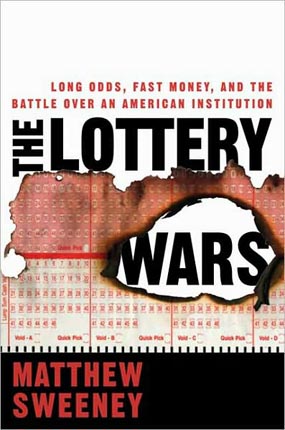Review by Joshua Spivak, as published in San Francisco Chronicle, April 7, 2009
"All you need is a dollar and a dream." This was the motto for New York Lottery's great ad campaign, and it truly captures the easy-money sales pitch that has turned the lottery into a nationwide success. And it's only growing. Dollars may be in short supply, thanks to the economic collapse, but the dream of instant riches endures.
This is actually an old tale. In "The Lottery Wars," Matthew Sweeney takes an incisive and sweeping look into America's long fascination with the lottery. Although the book is a fairly short read, it is also a pleasure: a non-polemical, fact-filled encounter with a kaleidoscopic view of the lottery. Starting with the lottery's early origins in this country, Sweeney looks at how the lottery has shaped the United States and how the U.S. government and society are shaped by it. Along the way, the reader is also treated to understanding a bit about how America's financial system and infrastructure got built.
(review continues below)
 Click the book image to
Click the book image to
purchase The Lottery Wars
for $16.50 (save 34%)
Throughout its entire history, government-sponsored lotteries have been a controversial money-raising venture. Government officials love the cash, almost always claiming it goes to education, but the lottery has always been under fire from both the right and left flanks, as it is viewed as both an incentive to avoid hard work or a tax on the poor. Early Puritan religious leaders, modern-day Christian conservatives and liberal reformers and activists have all been staunch opponents. This opposition drives the narrative of "The Lottery Wars," but Sweeney does not let it overwhelm the rest of the story. He is at his best when going into the little-known details about the lottery pre-Civil War life span, especially its role in financing the building of the United States. He charts how opposition to the lottery helped create both the institution of savings banks and municipal bond markets.
Starting in the mid-19th century, the lottery opponents gained the upper hand. According to Sweeney's analysis, this was partly because of the underworld having and marketing a better product. The illegal games were the ones that allowed people to pick their own numbers, not the government lotteries. But the lotteries have made a ferocious comeback. It started in 1964, but it was really the 1970s adoption of the jackpot lotto games that turned the tide and made the government-sponsored gambling a big money winner.
The financial windfall has resulted in the lottery becoming a serious political weapon for insurgent politicians in the states that did not have it. Sweeney searches through the backwoods of the South for the key stories about how the lottery expanded into these regions.
As with any work on the lottery, Sweeney must deal with famous winners. Fortunately, he doesn't get too lost in these tales. Rather than take from the trove of the most shocking stories, he concentrates on some original reporting by filling in the tale of Curtis Sharp. Sharp was one of the nation's most famous winners, a quick-witted New Yorker who won a $5 million lotto jackpot in 1982, and showed up to collect with his wife on one arm and his girlfriend on the other. He became a walking spokesman for the lottery's potential in the Big Apple. While it is not anywhere near the worst of the lottery curse stories, unsurprisingly, Sharp has both found religion and lost his fortune.
The dark underbelly of the lottery is ever present in the story. Sweeney takes us through the numbers rackets that dominated the gambling world in the early part of the century and the dream books that tell people which numbers to bet on. Of course, a chapter is also devoted to lottery addiction. The lotto games, with their hundreds of millions in jackpot drawings, are a stagnant part of the industry. The current growth has been predicated on instant-gratification games like keno and scratch tickets that now go up to $20 per, played heavily by addicts. Californians can take a little pride here: The state is known as having one of the worst lotteries in the country, thanks to legislators who have inhibited the ability of the lottery commissioner to market and advertise the games. Californians spend an average of $98 a year on the games. The average Massachusetts resident spends $700.
The tales of lottery addiction and other unpleasant stories does give the book an anti-lottery slant. What is missing is some alternative history analysis of what would happen if lotteries were banned or simply didn't exist. Would no state lottery mean transferring the winnings to criminal mobs, as had been the case for most of the 20th century? This positive angle to the lottery isn't really explored, but it is only a minor failing to a very strong book.




Sounds like an interesting read.
This does sound like a good read. I've seen the history of the lottery on the history channel but this book seems to lend insight on many different angles and not just the history. Anybody read it yet.